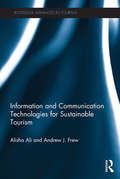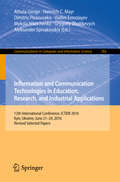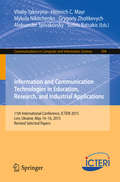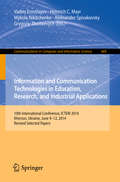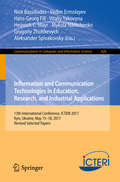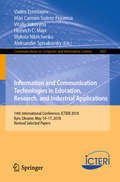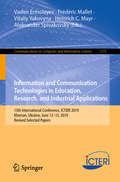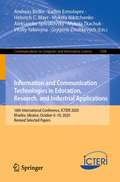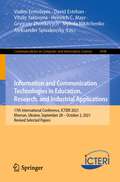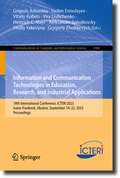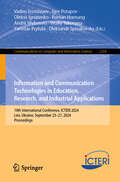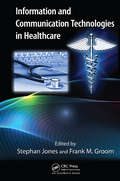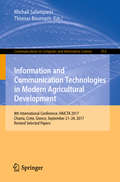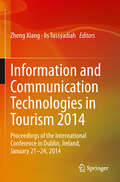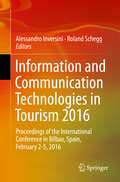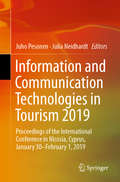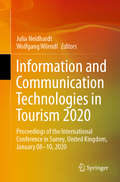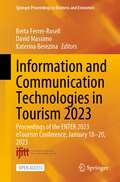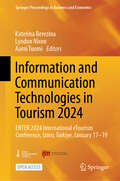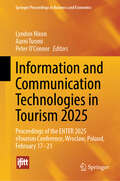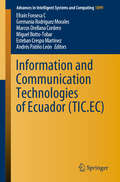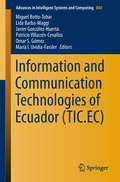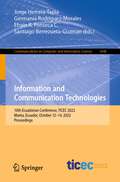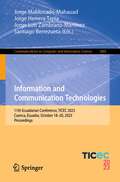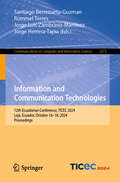- Table View
- List View
Information and Communication Technologies for Sustainable Tourism (Advances in Tourism)
by Alisha Ali Andrew J. FrewSustainable development is a highly topical issue and is of critical importance to tourism as the environment is of utmost importance for the continued development and prosperity of the industry. There have been numerous texts written on sustainable tourism and the measures to mitigate and manage this but none which acknowledges Information and Communication Technologies (ICT) as a mechanism of doing so despite being an emerging area of research. ICT in this context refers to innovative tools which form an integrated system of software and networked equipment that facilitates data processing information sharing communication and the ability to search and select from an existing range of products and services for an organisation’s benefits. Despite the symbiotic relationship, which exists between ICT and sustainable tourism, there has been little research, which has considered how the use of such technology can be used to make sustainable tourism development a more workable reality. This opportune book is the first to provide a focus on the interrelationship of these two important topics demonstrating their synergies and providing insight into a new and innovative approach to managing sustainable tourism development. It considers the use of technology to reduce the negative impacts of tourism from both the demand and supply side perspectives. A critical review of a range of cutting edge technologies used by tourists and businesses to assess their usefulness in managing sustainable tourism development from the macro to the micro level is also discussed. It further integrates examples and practical applications to show how ICT can be an invaluable mechanism in the management of sustainable tourism development. This cutting-edge volume provides a wealth of information on an important yet neglected subject. This book will be invaluable reading for students, researchers, academics and members of the tourism industry looking for new and innovate ways of fostering a more sustainable tourism industry.
Information and Communication Technologies in Education, Research, and Industrial Applications
by Heinrich C. Mayr Mykola Nikitchenko Grygoriy Zholtkevych Vadim Ermolayev Athula Ginige Dimitris Plexousakis Aleksander SpivakovskiyThis book constitutes the thoroughly refereed proceedings of the 11th International Conference on Information and Communication Technologies in Education, Research, and Industrial Applications, ICTERI 2015, held in Lviv, Ukraine, in May 2015. The 9 revised full papers presented were carefully reviewed and selected from 119 submissions. The papers are grouped into two parts: ICT in education and industrial applications, and formal frameworks.
Information and Communication Technologies in Education, Research, and Industrial Applications
by Vitaliy Yakovyna Heinrich C. Mayr Mykola Nikitchenko Grygoriy Zholtkevych Aleksander Spivakovsky Sotiris BatsakisThis bookconstitutes the thoroughly refereed proceedings of the 11th InternationalConference on Information and Communication Technologies in Education,Research, and Industrial Applications, ICTERI 2015, held in Lviv, Ukraine, inMay 2015. The 9 revisedfull papers presented were carefully reviewed and selected from 119submissions. The papers are grouped into two parts: ICT in education andindustrial applications, and formal frameworks.
Information and Communication Technologies in Education, Research, and Industrial Applications
by Heinrich C. Mayr Mykola Nikitchenko Grygoriy Zholtkevych Aleksander Spivakovsky Vadim ErmolayevThis book constitutes the thoroughly refereed proceedings of the 10th International Conference on Information and Communication Technologies in Education, Research, and Industrial Applications, held in Kherson, Ukraine, in June 2014. The 16 revised full papers presented were carefully reviewed and selected from 66 submissions. The papers are organized in topical sections on framework and tools; information and communication technologies in teaching and learning; information and communication technologies in research and industrial applications.
Information and Communication Technologies in Education, Research, and Industrial Applications: 11th International Conference, Icteri 2015, Lviv, Ukraine, May 14-16, 2015, Revised Selected Papers (Communications In Computer And Information Science #594)
by Vitaliy Yakovyna Heinrich C. Mayr Mykola Nikitchenko Grygoriy Zholtkevych Aleksander Spivakovsky Vadim Ermolayev Nick Bassiliades Hans-Georg FillThis book contains extended versions of the best papers presented at the 13th International Conference on Information and Communication Technologies in Education, Research, and Industrial Applications, ICTERI 2017, held in Kyiv, Ukraine, in May 2017.The 11 revised full papers included in this volume were carefully reviewed and selected from 151 initial submissions during several rounds of reviewing. The papers are organized in the following topical sections: modeling and theoretical frameworks; ICT in teaching, learning, and education management; and ICT evaluation and applications.
Information and Communication Technologies in Education, Research, and Industrial Applications: 14th International Conference, ICTERI 2018, Kyiv, Ukraine, May 14-17, 2018, Revised Selected Papers (Communications in Computer and Information Science #1007)
by Vitaliy Yakovyna Heinrich C. Mayr Mykola Nikitchenko Aleksander Spivakovsky Vadim Ermolayev Mari Carmen Suárez-FigueroaThis book contains extended versions of the best papers presented at the 14th International Conference on Information and Communication Technologies in Education, Research, and Industrial Applications, ICTERI 2018, held in Kyiv, Ukraine, in May 2018.The 14 revised full papers included in this volume along with one invited full paper were carefully reviewed and selected from 257 initial submissions. The papers are organized in the following topical sections: advances in ICT research, ICT in education and education management, ICT solutions for industrial applications.
Information and Communication Technologies in Education, Research, and Industrial Applications: 15th International Conference, ICTERI 2019, Kherson, Ukraine, June 12–15, 2019, Revised Selected Papers (Communications in Computer and Information Science #1175)
by Vitaliy Yakovyna Heinrich C. Mayr Aleksander Spivakovsky Vadim Ermolayev Frédéric MalletThis book contains extended versions of the best papers presented at the 15th International Conference on Information and Communication Technologies in Education, Research, and Industrial Applications, ICTERI 2019, held in Kherson, Ukraine, in June 2019.The 19 revised full papers included in this volume were carefully reviewed and selected from 416 initial submissions. The papers are organized in the following topical sections: advances in ICT and IS research; ICT in teaching, learning, and education management; applications of ICT in industrial and public practice.
Information and Communication Technologies in Education, Research, and Industrial Applications: 16th International Conference, ICTERI 2020, Kharkiv, Ukraine, October 6–10, 2020, Revised Selected Papers (Communications in Computer and Information Science #1308)
by Vitaliy Yakovyna Heinrich C. Mayr Mykola Nikitchenko Grygoriy Zholtkevych Aleksander Spivakovsky Vadim Ermolayev Andreas Bollin Mykola TkachukThis book contains revised and extended versions of the best papers presented at the 16th International Conference on Information and Communication Technologies in Education, Research, and Industrial Applications, ICTERI 2020, held in Kherson, Ukraine, in October 2020. Due to the COVID-19 pandemic the conference was held online. The 8 revised full papers included in this volume were carefully reviewed and selected from 347 initial submissions. The papers are organized in the following topical sections: ICT in education; ICT in research and industry.
Information and Communication Technologies in Education, Research, and Industrial Applications: 17th International Conference, ICTERI 2021, Kherson, Ukraine, September 28–October 2, 2021, Revised Selected Papers (Communications in Computer and Information Science #1698)
by Vitaliy Yakovyna Heinrich C. Mayr Mykola Nikitchenko Grygoriy Zholtkevych Aleksander Spivakovsky Vadim Ermolayev David EstebanThis book constitutes the refereed proceedings of the 17th International Conference onInformation and Communication Technologies in Education, Research, and Industrial Applications, ICTERI 2021, held in Kherson, Ukraine, during September 28–October 2, 2021.The 12 full papers were included in this book were carefully reviewed and selected from 24 submissions. They were organized in topical sections as follows: The Fundamentals of ICT; Natural Language Processing for the Ukrainian Language; The Applications of Novel ICT; and ICT in Teaching and Learning.
Information and Communication Technologies in Education, Research, and Industrial Applications: 18th International Conference, ICTERI 2023, Ivano-Frankivsk, Ukraine, September 18–22, 2023, Proceedings (Communications in Computer and Information Science #1980)
by Grigoris Antoniou Vitaliy Yakovyna Heinrich C. Mayr Grygoriy Zholtkevych Aleksander Spivakovsky Vadim Ermolayev Vitaliy Kobets Vira LiubchenkoThis book constitutes the proceedings of the 18th International Conference, ICTERI 2023, held in Ivano-Frankivsk, Ukraine, during September 18–22, 2023.The 21 full papers included in this volume were carefully reviewed and selected from 90 submissions. The volume focuses on research advances in ICT, business or academic applications of ICT, and design and deployment of ICT infrastructures.
Information and Communication Technologies in Education, Research, and Industrial Applications: 19th International Conference, ICTERI 2024, Lviv, Ukraine, September 23–27, 2024, Proceedings (Communications in Computer and Information Science #2359)
by Vitaliy Yakovyna Vadim Ermolayev Igor Potapov Oleksii Ignatenko Roman Hornung Andrii Hlybovets Yaroslav Prytula Oleksandr SpivakovskyThis book constitutes the proceedings of the 19th International Conference on Information and Communication Technologies in Education, Research, and Industrial Applications, ICTERI 2024, held in Lviv, Ukraine, during September 23–27, 2024. The 29 full papers, 2 short papers and 3 keynote papers included in this volume were carefully reviewed and selected from 83 submissions. They were organized in topical sections as follows: main conference; PhD symposium; and research in progress.
Information and Communication Technologies in Healthcare (Technology For Non-engineers Ser.)
by Stephan Jones Frank M. GroomAs the population ages and healthcare costs continue to soar, the focus of the nation and the healthcare industry turns to reducing costs and making the delivery process more efficient. Demonstrating how improvements in information systems can lead to improved patient care, Information and Communication Technologies in Healthcare explains how to cr
Information and Communication Technologies in Modern Agricultural Development: 8th International Conference, Haicta 2017, Chania, Crete, Greece, September 21-24, 2017, Revised Selected Papers (Communications in Computer and Information Science #953)
by Thomas Bournaris Michail SalampasisThis book constitutes the thoroughly refereed post-conference proceedings of the 8th International Conference on Information and Communication Technologies in Agriculture, Food and Environment, HAICTA 2017, held in Chania, Crete, Greece, in September 2017. <p><p> The 14 revised full papers presented in this book were carefully selected from the 55 accepted full papers out of 124 submissions. The selected papers span across various subjects, from ICT innovations and smart farming, to decision support systems, as well as precision farming, disease diagnosis using mobile devices, IoT for monitoring and controlling animal production, sensor-based solutions, GIS-based water management, environmental planning, information systems for monitoring of fish stocks and fisheries, information management in the agri-food sector, and forestry planning and management.
Information and Communication Technologies in Tourism 2014
by Zheng Xiang Iis TussyadiahThe papers presented in this volume advance the state-of-the-art research on social media and Web 2. 0, electronic tourism marketing, website development and evaluation, search engine marketing and optimization, IT adoption and diffusion, virtual travel communities, mobile technologies, management information systems in tourism, eLearning, recommender systems for tourism businesses and destinations and electronic distribution for hospitality and travel products. This book covers the most significant topics contributed by prominent scholars from around the world and is suitable for both academics and practitioners who are interested in the latest developments in e-Tourism.
Information and Communication Technologies in Tourism 2016
by Alessandro Inversini Roland ScheggThe papers presented in this volume advance thestate-of-the-art research on digital marketing and social media, mobile computingand responsive web design, semantic technologies and recommender systems,augmented and virtual reality, electronic distribution and online travelreviews, MOOC and eLearning, eGovernment and sharing economy. This book coversthe most significant areas contributed by prominent scholars from around theworld and is suitable for both academics and practitioners who are interestedin the latest developments in eTourism.
Information and Communication Technologies in Tourism 2019: Proceedings Of The International Conference In Nicosia, Cyprus, January 30 - February 1 2019
by Juho Pesonen Julia NeidhardtThis book provides an extensive, up-to-date overview of the ways in which information and communication technologies (ICTs) can be used to develop tourism and hospitality. The coverage encompasses a wide variety of topics within the field, including virtual reality, sharing economy and peer-to-peer accommodation, social media use, hotel technology, big data, robotics, and recommendation systems, to name but a few. The content is based on the 2019 ENTER eTourism conference, organized in Nicosia, Cyprus by the International Federation for Information Technologies and Travel & Tourism (IFITT) – the leading independent global community for the discussion, exchange, and development of knowledge on the use and impact of new ICTs in the travel and tourism industry. The book offers a global perspective and rich source of information on important innovations and novel ideas. Though it will prove especially valuable for academics working in the eTourism field, it will also be of considerable interest to practitioners and students.
Information and Communication Technologies in Tourism 2020: Proceedings of the International Conference in Surrey, United Kingdom, January 08–10, 2020
by Julia Neidhardt Wolfgang WörndlGathering the outcomes of the 27th annual international eTourism conference ENTER2020, this book presents new research, innovative systems and industry case studies on the application of Information and Communication Technologies (ICT) in travel and tourism. It shares the latest findings discussed at the conference and highlights various topics within the field, including social media, destination marketing, recommender systems and decision-making, virtual and augmented reality, technology in tourism, and research on hotels and activities. Readers will find a wealth of state-of-the-art insights and ideas on how information and communication technologies can be applied in travel and tourism.
Information and Communication Technologies in Tourism 2023: Proceedings of the ENTER 2023 eTourism Conference, January 18-20, 2023 (Springer Proceedings in Business and Economics)
by Berta Ferrer-Rosell David Massimo Katerina BerezinaThis open access book provides an extensive overview of the usage of information and communication technologies in the tourism and hospitality industry. It presents the proceedings of the International Federation for IT and Travel & Tourism (IFITT)’s 30th Annual International eTourism Conference, which assembles the latest research presented at the ENTER2023 conference. The enclosed papers cover various topics within the field, including augmented and virtual reality, website development, social media use, e-learning, big data, analytics and recommendation systems.
Information and Communication Technologies in Tourism 2024: ENTER 2024 International eTourism Conference, Izmir, Türkiye, January 17-19 (Springer Proceedings in Business and Economics)
by Lyndon Nixon Katerina Berezina Aarni TuomiFor more than 30 years, Information and Communication Technology (ICT) has been revolutionizing travel, tourism, and hospitality, and as we look to the next 30 years, the change of pace does not seem to be diminishing. This open-access book provides an extensive overview of the latest developments of ICTs in the tourism and hospitality industry. Featuring papers presented at the International Federation for IT and Travel & Tourism’s (IFITT) 31st annual ENTER International eTourism Conference (ENTER24) held in Izmir, Türkiye, this book presents research on topics such as artificial general intelligence (AGI) in tourism and hospitality; emerging technologies in tourism education; virtual reality; technologies for sustainability, health and wellbeing; big data and analytics, among others. This is an open access book.
Information and Communication Technologies in Tourism 2025: Proceedings of the ENTER 2025 eTourism Conference, Wroclaw, Poland, February 17–21 (Springer Proceedings in Business and Economics)
by Peter O'Connor Lyndon Nixon Aarni TuomiThis book provides an extensive overview of the latest developments in information and communication technologies (ICTs) in the tourism and hospitality industry. Featuring papers presented at the International Federation for IT and Travel & Tourism’s (IFITT) 32nd annual ENTER International eTourism Conference (ENTER25) held in Wroclaw, Poland, this book examines the future of the tourism and hospitality industry and the impact ICTs such as generative AI, robotics, and Internet of things (IoT) has in creating a sustainable future for the industry. Information and communication technologies (ICTs) continue to revolutionize travel, tourism, and hospitality. Over 30+ years, the ENTER eTourism conference has been at the forefront of providing insight on the use and impact of new technologies for travel, tourism and hospitality practitioners and researchers. However, the rapid development and deployment of new developments, including generative AI (GenAI), service robotics, IoT, and Extended Realities (XR) technologies, among others, call for a rapid and careful reassessment of ICT in tourism, particularly including ethical and societal considerations. Examining the answer to questions such as how can technology help businesses and organizations be more agile, innovative, and resilient in difficult times; what role does technology play in driving sustainable development; how emerging technologies impact customer and employee experiences, and how challenges and dangers presented by technological disruption can be addressed, this book is valuable to scholars, researchers, students, and practitioners in tourism and hospitality.
Information and Communication Technologies of Ecuador (Advances in Intelligent Systems and Computing #1099)
by Miguel Botto-Tobar Efraín Fonseca C Germania Rodríguez Morales Marcos Orellana Cordero Esteban Crespo Martínez Andrés Patiño LeónThis book constitutes the proceedings of the Sixth Conference on Information and Communication Technologies “TIC.EC”, held in Cuenca, Ecuador, from November 27 to 29, 2019. Considered one of the most important conferences on ICT in Ecuador, it brings together scholars and practitioners from the country and abroad to discuss the development, issues and projections of the use of information and communication technologies in multiples fields of application. The 2019 “TIC.EC” conference was organized by Universidad del Azuay (UDA) and its Engineering School, as well as the Ecuadorian Corporation for the Development of Research and Academia (CEDIA). The book covers the following topics:· Software engineering· Security· Data· Networks· Architecture· Applied ICTs· Technological entrepreneurship· Links between research and industry· High-impact innovation· Knowledge management and intellectual property
Information and Communication Technologies of Ecuador (Advances in Intelligent Systems and Computing #884)
by Miguel Botto-Tobar Lida Barba-Maggi Javier González-Huerta Patricio Villacrés-Cevallos Omar S. Gómez María I. Uvidia-FasslerThis book constitutes the proceedings of the 6th Conference on Information Technologies and Communication of Ecuador “TIC-EC”, held in Riobamba City from November 21 to 23, 2018, and organized by Universidad Nacional del Chimborazo (UNACH) and its Engineering School, and the Ecuadorian Corporation for the Development of Research and Academia (CEDIA). Considered as one of the most important ICT conferences in Ecuador, it brought together international scholars and practitioners to discuss the development, issues and projections of the use of information and communication technologies in multiple fields of application.Presenting high-quality, peer-reviewed papers, the book discusses the following topics:• Communication networks• Software engineering• Computer sciences• Architecture• Intelligent territory management• IT management• Web technologies• ICT in education• Engineering, industry, and construction with ICT support• Entrepreneurship and innovation at the Academy: a business perspectiveThe authors would like to express their sincere gratitude to the invited speakers for their inspirational talks, to the authors for submitting their work to this conference, and the reviewers for sharing their experience during the selection process.
Information and Communication Technologies: 10th Ecuadorian Conference, TICEC 2022, Manta, Ecuador, October 12–14, 2022, Proceedings (Communications in Computer and Information Science #1648)
by Efraín R. Fonseca C. Santiago Berrezueta-Guzman Jorge Herrera-Tapia Germania Rodriguez-MoralesThis book constitutes refereed proceedings of the 10th Ecuadorian Conference on Information and Communication Technologies, TICEC 2022, held in Manta, Ecuador, in October 2022.The 20 full papers were carefully reviewed and selected from 150 qualified submissions. The papers cover a great variety of topics, such as wireless communication, immersive environments, artificial intelligence, data mining, neural networks, augmented reality, cyberphysical systems, telemedicine, cybersecurity, software architecture, data processing, software development, and others. The contributions are divided into the following thematic blocks: ICT´s Applications; Data Science; Software Development.
Information and Communication Technologies: 11th Ecuadorian Conference, TICEC 2023, Cuenca, Ecuador, October 18–20, 2023, Proceedings (Communications in Computer and Information Science #1885)
by Santiago Berrezueta Jorge Herrera-Tapia Jorge Maldonado-Mahauad Jorge Luis Zambrano-MartínezThis book constitutes the proceedings of the 11th Ecuadorian Conference on Information and Communication Technologies, TICEC 2023, held in Cuenca, Ecuador, during October 18–20, 2023.The 31 full papers presented were carefully reviewed and selected from 120 submissions. The papers cover a great variety of topics, such as internet of things, cyber-physical systems, human-machine interface, artificial Intelligence, e-Learning, smart healthcare, smart healthcare and others. The papers are organized in the following topical sections: data science and machine learning; ICTs and their applications; and software development.
Information and Communication Technologies: 12th Ecuadorian Conference, TICEC 2024, Loja, Ecuador, October 16–18, 2024, Proceedings (Communications in Computer and Information Science #2273)
by Santiago Berrezueta-Guzman Jorge Herrera-Tapia Rommel Torres Jorge Luis Zambrano-MartinezThis book constitutes the refereed proceedings of the 12th Ecuadorian Conference on Information and Communication Technologies, TICEC 2024, held in Loja, Ecuador, during October 16–18, 2024. The 24 full papers presented here were carefully reviewed and selected from 74 submissions. They were organized in the following topical sections: Image Processing, Classification, and Segmentation; Artificial Intelligence and Machine Learning Applications; IoT, Embedded Systems, and Applications in Healthcare and Industrial Environments.
